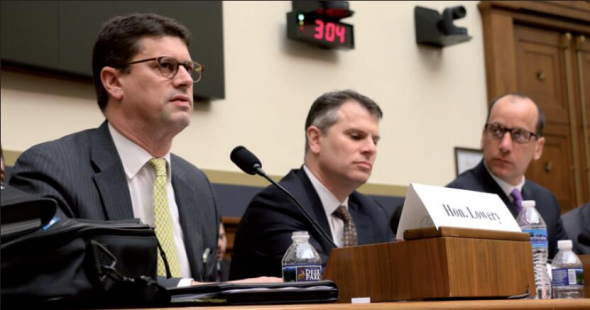
From left: Clay Lowery, managing director of Rock Creek Global Advisors; Jonathan Kallmer; senior vice-president at the Information Technology Industry Council; and David Marchick, managing director of The Carlyle Group, testify on Thursday before the House Financial Services Committee. (Photo by Chen Weihua/China Daily)
A bill that would tighten scrutiny of foreign investment in the United States could end up backlogging the panel responsible for the reviews and also disrupt financial deals, according to some elected officials and business experts.
The Foreign Investment Risk Review Modernization Act, or FIRRMA, was introduced last year in both the Senate and House in response to increased foreign investment in potentially sensitive sectors, in particular from countries like China and Russia.
FIRRMA will greatly expand the scope and power of the Committee on Foreign Investment in the United States (CFIUS), an interagency committee, by covering a wider range of transactions involving foreign investment.
While enjoying the support of many lawmakers from both the Republican and Democratic parties, some lawmakers and business leaders expressed in a hearing on Thursday that the act, if passed, could overwhelm CFIUS, given its limited resources, and would also hurt the competitiveness of U.S. businesses in the world.
Clay Lowery, managing director of Rock Creek Global Advisors, also a former U.S. assistant treasury secretary for international affairs, said key parts of the current FIRRMA bill are vague, duplicative and unnecessarily burdensome. He expressed that too many terms are yet to be defined and interpreted.
He expects the number of transactions under CFIUS review will expand from the current 200 a year to several thousand cases if FIRRMA is passed.
"CFIUS does not have adequate resources or expertise to deal with the massive number of cases that would result from the current draft of FIRRMA," Lowery said.
He voiced his support for a CFIUS modernization effort, but said "more work is needed to ensure that the outcome does not have the unintended consequence of chilling investment in the US and harming our competitiveness around the world".
Jonathan Kallmer, senior vice-president for global policy at the Information Technology Industry Council and a former deputy assistant US trade representative for investment, expressed concern that FIRRMA would empower CFIUS to review outbound transfers of US intellectual property to foreign persons.
"The result would be significant uncertainty among U.S. companies regarding their obligations to file with CFIUS. In the face of such uncertainty, companies would likely err on the side of filing, and CFIUS would experience an unmanageable increase in its caseload, with the vast majority of new cases presenting no national security risks at all," he said.
David Marchick, managing director of The Carlyle Group, stressed that CFIUS should be designed to scrutinize transactions that raise concerns but quickly approve those transactions that do not implicate US national security interests.
"In the M&A world, time is money," he said, referring to a disadvantage of U.S. firms that FIRRMA would impose compared to their international competitors. He echoed the view that FIRRMA will overwhelm CFIUS with an exorbitant number of cases.
Marchick expressed doubt over FIRRMA's expansion of CFIUS reviews of real estate deals, including leases, by foreign persons near a military installation in the U.S., citing the fact that foreign buyers acquired almost 300,000 residential properties in U.S. in 2017.
Trey Hollingsworth, a Republican congressman from Indiana, and Tom Emmer, a Republican congressman from Minnesota, both members of the House Financial Services Committee, raised concerns that the bill could impede the competitiveness of U.S. businesses.


















































